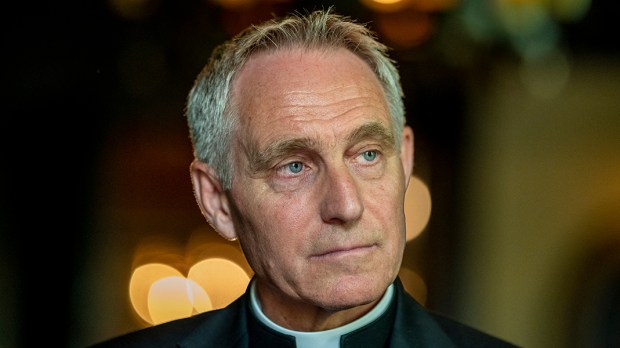When Benedict XVI resigned in the spring of 2013, “it seemed to him and to me—I can confess it here—that he had only a few months left, but not eight years,” Archbishop Georg Gänswein, the secretary of the pope emeritus, said at an Austrian psychiatric congress, the German periodical Die Tagespost reported on April 1.
The archbishop also spoke about the crisis in the Church, especially in Germany.
As an unexpected speaker at a conference organized by the Institute for Religion in Psychiatry and Psychotherapy, an Austrian institution, Archbishop Gänswein talked about the filial relationship he has had with the pope emeritus since the death of his own father. He rejoiced in the “ever-increasing closeness” that unites him to Benedict XVI, especially when they pray the Rosary together in the Vatican Gardens.
The German pope emeritus did not expect to stay so long in the Mater Ecclesiae monastery. “When he resigned in the spring of 2013, it seemed to him and to me—I can confess it here—that he had only a few months left, but not eight years.” “Everything has taken a different turn,” acknowledged the man who assists the 93-year-old pontiff emeritus every day.
The health crisis as seen from Mater Ecclesiae
The prefect of the Pontifical Household says that Benedict XVI—who was vaccinated last January—has been little affected personally by the health constraints resulting from the current pandemic. “It’s almost as if Pope Benedict, with his resignation eight years ago, had, so to speak, decided on an experimental confinement for us,” he says.
The archbishop said he is concerned about the psychological “collateral damage” the pandemic is bringing about in the world, and about the taboo of discussing “alarming suicide numbers.”
This is a time of “division and decision,” he said.
A “deep crisis” in the Church in Germany
Referring to the ongoing situation in his native country of Germany (also the homeland of Benedict), Archbishop Gänswein spoke of the existence of “serious dissent” within the Church “such as has not been seen for centuries.” Referring to the case of Germany, where divisions have grown in recent years, he said one can expect “different responses from each bishop.”
The Church is made up of “saints” and “criminals,” he said, citing Mother Teresa and former Cardinal Theodore McCarrick as examples. Saints may not recognize criminals who are close to them, he acknowledged, referring to the closeness of John Paul II and Marcial Maciel Delgado, the founder of the Legionaries of Christ, who was guilty of numerous abuses within his own community and beyond.

